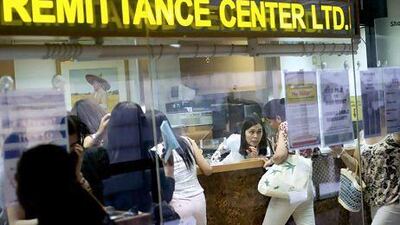Every six months, Mohammed Sherif Elabd transfers a lump sum of money to his local bank in Cairo.
He is one of thousands of Egyptians residing in Abu Dhabi who remit their hard-earned income to their home country.
"I am saving it for the future. Incase of events that come up that require financial commitments, like marriage," he says.
Mr Elabd has been lured by long-term certificates available at Egypt's banks which yield 12.5 per cent on his capital.
He came to Abu Dhabi nearly five years ago with ambitions of "a better life and career", he says. His move was meant to be a short stint but it all changed after the popular uprisings that toppled then president Hosni Mubarak, who had ruled the country for more than three decades.
"Because of what happened in my home country I decided to extend my stay for two to three years until I see what's going to happen," Mr Elabd says.
"The economy is not good and it's not getting better. In fact, it's deteriorating.
Egypt, which is the largest recipient of remittances in the Arab world, received a record US$19 billion from expatriates last year. The figure is a marked surge from $14.3bn in 2011.
The government launched the certificates through National Bank of Egypt, in April last year, which has received widespread investor interest from Egyptian expatriates.
The notes have collected about $1bn by the second quarter of last year, says Sherif Metwally, a senior analyst at National Bank of Abu Dhabi, which acts as a distributor for the investment programme in the UAE.
"This amount is likely reflected under the capital and financial accounts section of the country's balance of payments," said Sherif Metwally, a senior analyst at National Bank of Abu Dhabi.
Egypt, the most populous country in the Arab world, has been in talks with the IMF over a long-anticipated $4.8bn loan to ease its fiscal requirements after two years of unrest.
The agency is seeking reassurances Egypt's government can push through a fiscal and financial programme that includes tax increases and spending cuts.
Securing the IMF loan would send a positive message to international markets that Egypt was on the path to a sustainable economy and financial stability.
"It's not just about the loan," the country's finance minister Al Mursi Al Sayed Hegazy said in Abu Dhabi last month.
"It's about attaining a vote of confidence for Egypt's economy."
Last week, an IMF spokesman said the fund was "awaiting updated economic data and reform plans from the authorities".
"The economic conditions in Egypt have been evolving," the spokesman Gerry Rice said in Washington on Friday.
The IMF stands "ready to support a home-grown programme that addresses the economic and finance challenges that Egypt is facing, that is socially balanced and has broad ownership," Mr Rice said.
Moody's Investors Service downgraded the country's credit ratings last month to Caa1, the sixth downgrade since demonstrations toppled Mr Mubarak.
Egypt's currency, the pound, has lost 6.5 per cent of its value as the banking regulator restricted access to dollars to avert a sharp decline in foreign reserves.
The EGX 30 equity index has risen a mere 1.2 per cent this year, trading at 5404.29 points.

